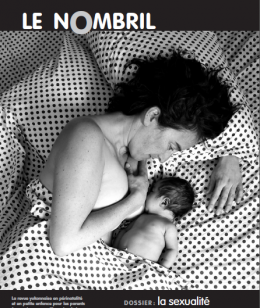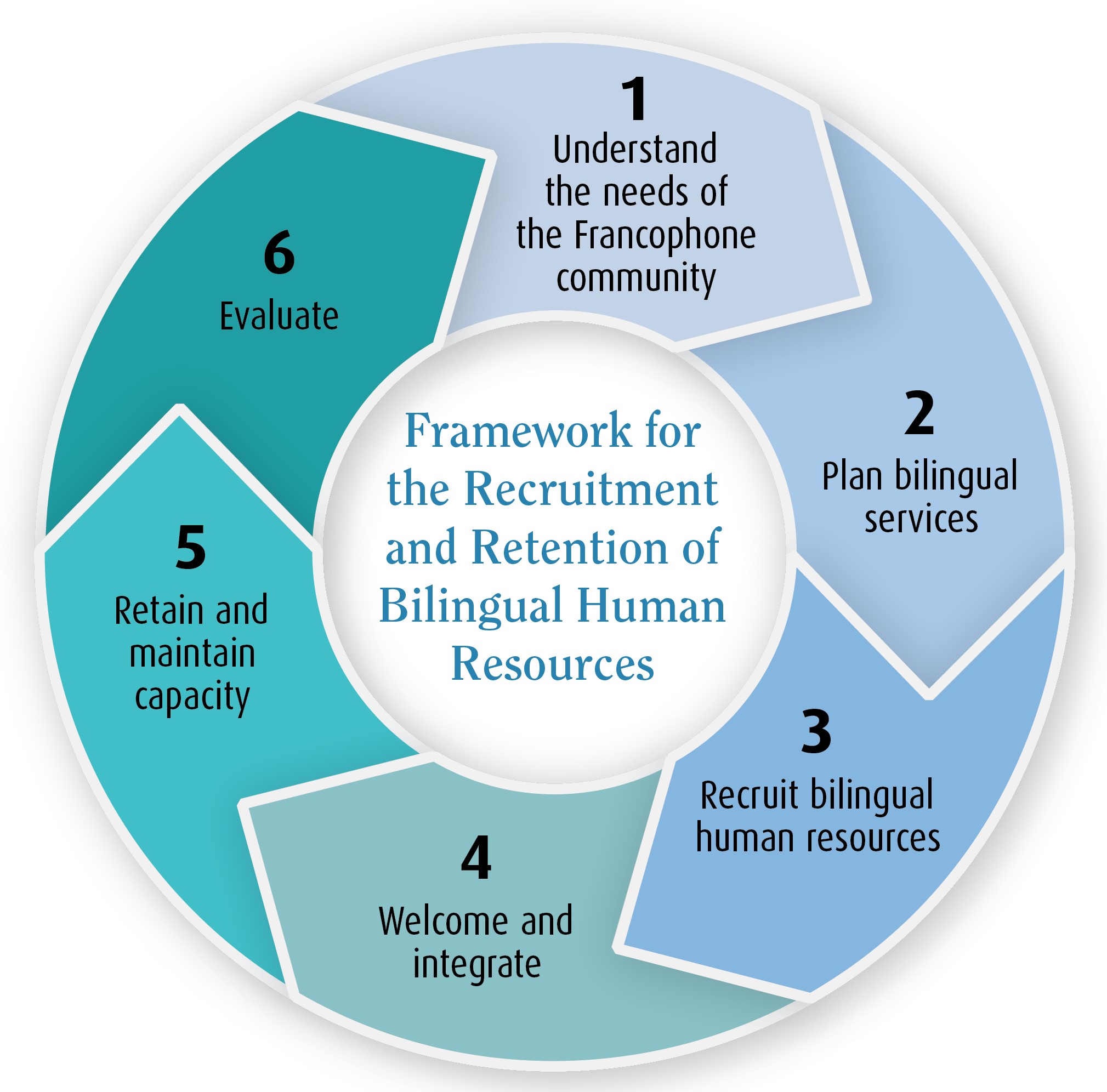2011 Census of Population: Linguistic Characteristics of Canadians
Statistics Canada
6 practical tips for the recrutment & retention of bilingual human resources in the health sector (Spring 2016)
The practical tips offered in this media campaign are base on the Framework for Recruitment & Retention of Bilingual Human Resources in the Health Sector from Société Santé en français et Réseau franco-santé du Sud de l'Ontario, March 2015.

- Best Practices
- Employment/working conditions
- Organizational Level
- Patient Centered
- Professional Level
- Spoken language
Addiction Toolkit
CAMH, Center for Addiction and Mental Health
This accessible and practical reference is for health care providers who work in a primary care setting and who have patients with substance use problems. Based on current clinical evidence and the extensive clinical experience of the editors and contributors, the toolkit provides brief answers to common clinical questions, as well as relevant clinical tools and patient resources.
- Health services
- Health Sources
- Patient Centered
- Personal health practices and coping skills
- Professional Level
- Social support networks
- Tools
Breastfeeding
Best Start Resource Centre from Health Nexus
Various tools and materials to assist health professional promoting breastfeeding amount new moms.
Commissariat aux services en français
The French Language Services Commissioner has a mandate to conduct independent investigations under the French Language Services Act, either in response to complaints or on his own initiative, to prepare reports on his investigations, and to monitor the progress made by government agencies in the delivery of French-language services in Ontario.
ÉDUCAVIE.ca (French resource)
OPHEA Écoles saines, Communautés saines, Nexus Santé, Élargir l'espace francophone (French resource)
éducavie.ca from educavie on Vimeo.
This site develops and sustains collaboration among public health professionals, community health services and francophone education services in Ontario. This network, which focuses on the health and well-being focus on the following topics: growth and sexuality, mental health, addiction, healthy eating and physical skills.
- Education and literacy
- Health Sources
- Healthy child development
- Patient Centered
- Personal health practices and coping skills
- Professional Level
- Social environments
- Tools
Interventions based on best practices for chronic disease prevention and health promotion
Public health Agency of Canada
- Best Practices
- Education and literacy
- Employment/working conditions
- Health services
- Health Sources
- Income and social status
- Organizational Level
- Patient Centered
- Personal health practices and coping skills
- Physical environments
- Social environments
Je parle français
Get on the right track to diversity and inclusion!
French speaking people are an invisible minority that are not recognized by a last name alone… Let the French speaker come to you.
Clearly place the focus on your bilingual staff using these simple and effective promotional tools. These posters, pins, and promo items have been proven effective by various Ontario organizations working with Francophone Minority Communities.
The models were enhanced in response to trials and recommendations by customers and users in health care settings.
Increase your staffs’ productivity and reduce patient confusion.
Place your order now!
Promo items prices and order sheet jan2015
- Best Practices
- Health services
- Health Sources
- Organizational Level
- Patient Centered
- Spoken language
- Tools
Le Nombril (French magazine)
 Perinatal and Early childhood magazine
Perinatal and Early childhood magazine
produced Yukon Francophone parents for the minority communities across Canada. (French only)
Marche vers le futur (Walking towards the futur)
"Marche vers le futur" is one of a kind initiative to prevent falls and designed to meet the needs of clients in remote regions. A design initiative to remotely meet client’s need on a unique fall prevention program. Through this program, seniors living in francophone minority communities can now receive similar training to those living in urban areas. Through videoconferencing, participants receive professional expertise which are not available in their communities.
Become a trainer following a free two day videoconferencing training.
For more information, contact CNFS – Volet Université d’Ottawa by email ([email protected]) or by phone at 613-562-5800ext 8027 or toll free at 1 877-221-2637
A design initiative to remotely meet client’s need on a unique fall prevention program. Through this program, seniors living in francophone minority communities can now receive similar training to those living in urban areas. Through videoconferencing, participants receive professional expertise which are not available in their communities.
Become a trainer following a free two day videoconferencing training.
For more information, contact CNFS – Volet Université d’Ottawa by email ([email protected]) or by phone at 613-562-5800ext 8027 or toll free at 1 877-221-2637- Education and literacy
- Health Sources
- Patient Centered
- Personal health practices and coping skills
- Tools
Older Adult Centres’ Association of Ontario (OACAO)
The Older Adult Centres' Association of Ontario, which was founded in 1973, is an incorporated non-profit provincial organization and a registered charity. The OACAO is funded entirely through membership fees, business partnerships, educational training ventures, management of special projects and various revenue generation initiatives.
A community facility that provides a diversity of activities and services in response to the needs of local older adult population.
- Health Sources
- Patient Centered
- Personal health practices and coping skills
- Social support networks
- Useful links
Ontario’s Policy Framework for Child and Youth Mental Health
A Shared Responsibility
As the champion of children and youth, the Ministry of Children and Youth Services (MCYS) has developed a policy framework to provide strategic direction for ongoing improvements over the next decade. The framework applies to all Ontario children and youth up to age 18.
Ministry of Children and Youth Services, November 2006
- Health services
- Health Sources
- Healthy child development
- Organizational Level
- Patient Centered
- Personal health practices and coping skills
- Systemic Level
Overview of demographic, economic and social profile of the Francophone population of Ontario between 2001 and 2006
Ontario Trillium Foundation
- Health Sources
- Income and social status
- Patient Centered
- Spoken language
- Statistics and Research
- Systemic Level
Portrait of Francophones in Ontario following the 2011 census according to the Inclusive Definition of Francophone (IDF)
Office of Francophone Affairs
- Gender
- Health Sources
- Patient Centered
- Social environments
- Spoken language
- Statistics and Research
- Systemic Level
Project 2008-2013
As part of the call for proposals 2010-2013, $1.4 million was distributed among 12 projets of health promotion for Francophones living in Central-Southwestern Ontario. This funding came out of a $21.5 million funding envelope from Health Canada through the Contribution Program to Improve Access to Health Services for Official Language Minorities, through Société Santé en français (SSF), an umbrella organization of 17 French language health networks. SSF is working to promote the development of healthy French language minority communities across Canada.
In the table below you will find a summary of the projects that have emerged due to the support of this funding. /French only
Tableau-Projets-2010-2013 (in French only)
Regroupement des intervenantes et intervenants francophones en santé et en services sociaux de l’Ontario (Rifssso)
Le Regroupement des intervenants francophones en santé et en services sociaux de l’Ontario (Rifssso) is a not-for-profit umbrella organization of French-speaking professionals working in the fields of health and social services. Its goal is to develop and support leadership among its members by offering them a variety of activities such as continuing professional development, networking, and so forth. In addition, Rifssso works to raise awareness within government of the challenges facing French-speaking professionals working in these fields.
Seniors Community Grant Program
As part of the Action Plan for Seniors, Ontario has introduced the first ever grants program, solely dedicated to helping seniors across the province.
The new Seniors Community Grant Program will help more seniors have a better quality of life by providing opportunities to be more socially active, volunteer and continue their learning in areas like technology and financial literacy.
This grant program will make $500,000 available for projects across Ontario that will help more seniors become socially engaged and feel part of their communities.
- Funding
- Health Sources
- Patient Centered
- Personal health practices and coping skills
- Social environments
Study – The evolution of English-French bilingualism in Canada from 1961 to 2011
Statistics Canada, May 2013
Research and Statistics on trends in bilingualism in Canada. Identification of factors that may explain the recent stagnation of bilingualism across the country since 2011.
Survey results to identify barriers faced by Francophones living with a disability or debilitating disease in Ontario
French provincial table for the disabled /Results in French only
- Health services
- Health Sources
- Patient Centered
- Physical environments
- Social environments
- Social support networks
- Statistics and Research
The Best Start Resource Centre
Best Start by health Nexus Santé
The Best Start Resource Centre produces multi-media resources on a broad range of topics related to preconception health, prenatal health and early child development, developed in collaboration with, or with support from other organizations and experts. Materials range from fact sheets, brochures, manuals, posters, displays and videos to program planning guides and reports.
THE IMPACT OF LANGUAGE BARRIERS ON PATIENT SAFETY AND QUALITY OF CARE
Final Report

Prepared by: Sarah Bowen, PhD
For: Société Santé en français
August, 2015.
KEY POINTS
1. Significant research has been conducted on the impact of language barriers on health and healthcare, particularly over the past two decades. This research, (and several sys-tematic and critical reviews) has provided compelling evidence of the negative impact of language barriers on healthcare access, patient satisfaction and experience, as well as disparities in receipt of care between English (dominant language) proficient patients and those facing language barriers.
2. Those facing language barriers also face increased risk of medication errors and com-plications, and adverse events. The rights of limited English proficient patients to in-formed consent and confidentiality are often not protected.
3. The research on language access does not align that well with the healthcare quality and safety literature; and not all applicable research is published in commonly-cited medical journals. This may contribute to low awareness of the risks of language barriers among providers and managers.
4. Due to data limitations, limited research on impacts of language barriers has been con-ducted in the Canadian setting. However, a review of the pathways through which lan-guage barriers impact quality of care and safety indicates that much of the international research is applicable in the Canadian context.
5. In contrast to the evidence of negative impacts of language barriers on quality of care (including risk of adverse events), there is not evidence of disparities in mortality be-tween English proficient patients and those facing language barriers. This finding is not unexpected, given what is known about the pathways by which language barriers affect care quality, and limitations of methods used to investigate the impact of language barri-ers on health outcomes.
6. There are several barriers to action in addressing the risks of language barriers to quali-ty of care and patient safety: lack of awareness of current research; gaps in Canadian research; lack of language coding in Canadian data; historical framing of linguistic ac-cess as an issue of cultural sensitivity (rather than patient safety); and failure to ade-quately “translate” available evidence into healthcare action.
7. Recent research has begun to outline the complexity of pathways by which language, culture, race/ethnicity and health literacy may affect patient care.
8. Current approaches to addressing the risks of language barriers rely on the dedication and insight of individual providers rather than implementation of effective, evidence-informed strategies at the system level. This is not acceptable in light of current knowledge of effective approaches to patient safety.
9. Implications of available evidence for future research, for the SSF, and for the patient safety movement are discussed.
- Health services
- Health Sources
- Organizational Level
- Patient Centered
- Personal health practices and coping skills
- Professional Level
- Spoken language
- Statistics and Research
Training Institute on Violence Against Women
Action ontarienne contre la violence faite aux femmes (AOcVF)
This organization offer training in French in person at the provincial and regional level, as well as an online self-learning modules training. They also created documents, analysis, intervention tools, advocacy tools, webcasts and podcasts. The institute constantly develops new training activities. You can find on their website information and resources you need to intervene effectively in the field of violence against women and children. (French service only)
- Best Practices
- Health Sources
- Patient Centered
- Personal health practices and coping skills
- Social environments
- Tools
VIDEOS ON THE ACTIVE OFFER OF FRENCH LANGUAGE HEALTH SERVICES
Le Réseau du mieux-être francophone du Nord de l’Ontario (RMEFNO)
This new tool, created with funding from Health Canada through an important partnership with Société Santé en français, is designed primarily for health care professionals and providers. It aims to raise awareness regarding the importance of proactively offering quality services in French to health care recipients.
Active Offer Introduction from Shebafilms Kelly Saxberg on Vimeo.
- Health services
- Health Sources
- Organizational Level
- Patient Centered
- Professional Level
- Spoken language
Visual census of official languages spoken in various Canadian cities, 2011 Census
Health Human Resources Strategy
The concepts and courses of action presented here are aimed at increasing French language health services across Canada. This online resource provides a framework for recruitment and retention of bilingual human resources in the context of health services for a minority population.




